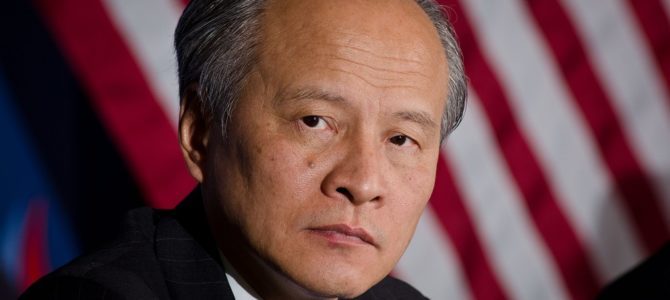
Communist China talks a big game about the need for “cooperation.” But for several decades, it has continuously worked to undermine cooperation. Perhaps more disturbingly, much of U.S. corporate media colludes with the regime’s deceit.
For the latest evidence of China’s bellicosity, consider recent reporting from U.S. intelligence that Chinese hackers have been attempting to steal intellectual property from U.S. institutions seeking Chinese coronavirus treatments and vaccines. These attempts may have already damaged vaccine research. This is on top of China’s increasingly overt acts of aggression from Taiwan to the South China Sea, and Australia to the European Union.
For the latest evidence of the U.S. media’s complicity, consider a representative example from a May 5 article in the Washington Post. The adopter of the “Democracy Dies in Darkness” tagline opened its opinion page to the democracy-defying Chinese Communist Party (CCP), printing an editorial from Chinese Ambassador to the United States Cui Tiankai.
The New York Times did so as well several weeks prior, allowing Tiankai to publish an editorial calling for “solidarity, collaboration and mutual support,” in what seemed to be a coordinated effort with some 100 Chinese scholars, who echoed this call in an open letter. They were joined by many of the media’s close partners in the U.S. national security and foreign policy establishment, nearly 100 of whom who signed a similar letter.
China Again Attempts to Deflect Deserved Blame
The Washington Post column, titled “Chinese ambassador: Ignoring the facts to blame China will only make things worse,” is a masterpiece of the CCP English-language propaganda genre. It begins with two big lies, and goes downhill from there.
First, Tankai says China “spared no expense to save lives.” It did no such thing.
Some things it might have done had it been such a humanitarian actor include: preserving coronavirus samples and inviting doctors from across the world to freely examine them; permitting its doctors to speak openly and honestly; halting international travel out of Hubei province, and suggesting that other countries close their borders too; apprising the world that the coronavirus spread by human-to-human transmission the second it knew this, consistent with the urgings of Taiwan; and allowing Taiwan to participate in World Health Organization (WHO) forums concerning the coronavirus.
Second, Tiankai says that “the absurd mind-set of ‘always blame China’” has been hampering “international efforts to curb the virus.” This isn’t true either.
While Tiankai would like to present the Chinese Communist Party as the victim, it is the assailant. Rather than “sparing no expense to save lives,” it instead spared no attempt to suppress the truth about what was transpiring, blame-shifted, and threatened those calling for basic accountability and transparency.
China’s Bad Behavior Has Meant Worldwide Deaths
In fact, China has coerced some international agencies into whitewashing its reporting on such actions. The CCP is the party that hampered international efforts to curb the virus from day one, and its unwillingness to open its figurative books to this day shows it is the major stumbling block to such “efforts to curb the virus.”
On top of the litany of other ways it has toed the Communist Party line, according to German intelligence the WHO refrained from issuing a warning about the coronavirus due to CCP pressure. It is the CCP that seems to have been plagued by an “always blame America” mindset in spreading conspiracy theories about the pandemic emanating from the U.S. military or intelligence.
Tiankai claims China’s response to the pandemic “brought precious time for the world.” Yet the Post itself has written extensively on the incompetence and deception that marked China’s disastrous response—even seeking to leverage it against President Trump by claiming he was too trusting of Beijing—leading to the further spread of the disease.
China’s plodding response, while it was working overtime to cover up the outbreak, according to one study dramatically increased the spread of cases globally. According to that study, had Chinese authorities acted three weeks earlier, they could have prevented 95 percent of worldwide cases.
Tiankai claims the CCP shared information in a timely fashion. This is also contradicted by the Post’s own reporting, and its evasiveness about preservation and lab access. The timeline of events shows a Chinese government-run lab identified the virus on Jan. 2. China then waited a full week to report the virus, and another three days before sharing the genome they had discovered.
Again, the Post has reported frequently about the importance of speed in a response to a pandemic, naturally including a thorough and unsparing investigation into the Trump administration’s response. It has even criticized Beijing’s slow response.
Post Reporting Contradicts China’s Own Claims
Last but not least, Tiankai touts China’s information-sharing efforts with the United States. Once again, this is belied by the Post’s own reporting. It fact-checked whether the Trump administration tried to get American personnel on the ground in China.
That review noted that “behind the scenes, the Chinese initially would not invite Americans to join a planned WHO visit” in February. The Post concluded that former Vice President Biden deserved “three Pinocchios” for accusing President Trump of not seeking to send medical experts to China, noting, albeit in characteristically grudging fashion:
The administration sought access for CDC experts — and as noted earlier, an administration official, speaking not for attribution, says an offer to send staff was made at the presidential level. Whether Trump didn’t ‘put pressure’ on Xi behind the scenes remains unclear, though Trump’s public comments and tweets do not indicate much pressure. But, given Chinese sensitivities, perhaps no amount of pressure would have worked.
Study Your Lincoln Again, Bub
Tiankai also managed to run some other standard plays from the totalitarian propagandist’s playbook. He labeled critics of the WHO over its clear kowtowing to the CCP, to devastating effect, conspiracy theorists. That is, he sought to smear, and therefore neutralize dissenters from the CCP narrative.
He also cynically invoked Abraham Lincoln—as is the CCP’s wont—in appealing to America’s “better angels” to “work for our shared future together.” The problem is the history of U.S.-China relations for the better part of 50 years has been of one side largely cooperating, and the other side largely taking advantage of this supposed cooperation.
Lincoln almost certainly would not have counseled that America coddle such a hostile adversary. And while Tiankai speaks at liberty about Lincoln in an American newspaper, one wonders whether China’s citizens can freely read Lincoln’s writings and speeches behind the country’s Great Firewall.
Spreading Propaganda Should Be a Bridge Too Far
More broadly, one wonders why a paper that purports to shine a light on truth in defense of democracy would provide the Communist Party regime space in its pages. Understand, Tiankai is the chief mouthpiece of the CCP in America, and the Washington Post is supposed to be one of America’s preeminent news publications.
Democracy isn’t dying in darkness. It’s being bludgeoned in broad daylight.
Long hysterical over claims of foreign influence from Russia in the 2016 election, the media is now participating in a far more pervasive and poisonous foreign influence operation from China. Yes, newspapers print all manner of opinions, but why should they serve as conduits for and legitimize anti-American propaganda in furtherance of a global disinformation campaign?
Perhaps still worse than our media providing an open platform for the CCP is its parroting of CCP propaganda. We daily see a steady stream of such examples:
We were subjected to hysteria about foreign influence on our political system—amateur efforts that had no discernible impact on the electorate—from our media for more than three years. Now our media is engaging in a de facto Chinese Communist Party information operation https://t.co/1OCawOp2Vz
— Benjamin Weingarten (@bhweingarten) May 11, 2020
Third day in a row – Friday, Saturday, Sunday – of Reuters running headlines that are word for word propaganda from the Chinese Communist Party. pic.twitter.com/offWP2KDt0
— Omri Ceren (@omriceren) May 10, 2020
Beyond TDS, why are countless members of our media acting like unregistered foreign agents for the Chinese Communist Party? https://t.co/X1z120siiH
— Benjamin Weingarten (@bhweingarten) May 4, 2020
The CCP is doing everything it can to deflect from its culpability in spreading the coronavirus, to calamitous effect. Our corporate media is happily obliging, both in giving the CCP direct entrée to it, and parroting its narratives.
The primary beneficiary of efforts to de-link the coronavirus pandemic from China on grounds of anti-racism, and divert the globe’s gaze from the CCP by shining the spotlight on their critics—as our media has largely done—is the CCP.
Given the pervasiveness of these CCP narratives, propagated by purported American publications since the breakout of the coronavirus pandemic, we ought to ask: Have media drunk the CCP Kool-Aid, is coronavirus coverage primarily geared towards dunking on Trump, or this ultimately about the money, given many U.S. publication’s pecuniary ties to China?
None of these answers are good for the American people, the media that claims to serve them, or our constitutional republic.









